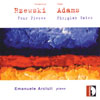Adams Phrygian Gates; Rzewski Four Pieces
A bracing and revealing guide through these modern piano works
View record and artist detailsRecord and Artist Details
Composer or Director: Frederic (Anthony) Rzewski, John Adams
Genre:
Instrumental
Label: Stradivarius
Magazine Review Date: 13/2006
Media Format: CD or Download
Media Runtime: 58
Mastering:
Stereo
DDD
Catalogue Number: STR33735

Tracks:
| Composition | Artist Credit |
|---|---|
| Phrygian Gates |
John Adams, Composer
Emanuele Arciuli, Piano John Adams, Composer |
| Four Pieces |
Frederic (Anthony) Rzewski, Composer
Emanuele Arciuli, Piano Frederic (Anthony) Rzewski, Composer |
Author: Philip_Clark
Emanuele Arciuli is a deliberate pianist who’s unafraid to demarcate structural joins with his brittle attack and strategic nose for harmony. His playing is unlikely to find favour if a traditionally “classical” notion of pianism is your thing; but for Rzewski’s Four Pieces and Adams’s Phrygian Gates it’s manna from heaven.
Frankly the Four Pieces, written in 1977, aren’t vintage Rzewski. He views them as a response to Schubert’s Impromptus, Op 142, in which each movement has a stand-alone feel, but taken as a whole the work is a cut-and-shut construct. Rzewski characteristically aims to make different styles co-exist within a structure that concertinas outwards to contain them. Socialist Realist revolutionary songs à la Cornelius Cardew are dropped into the structure and then dispersed with pointillistic clusters. Exploratory tremolos outlining familiar chord sequences break into expressionist outbursts, while the jazzy Thelonious Monk-flavoured second movement sounds surprisingly academic. Arciuli fastidiously characterises each panel of this information overload and guides the listener intelligently through what is a potential minefield. But the different styles struggle to illuminate each other, and the music remains unyielding.
The trajectory of John Adams’s Phrygian Gates is – in contrast – plain sailing. The work has a satisfying inevitability from its first note to the epic conclusion that appears on the horizon some 20 minutes later. Other pianists, almost to a man, view it as “minimalism with climaxes”, but Arciuli chooses to highlight the romantic streak that’s equally part of its DNA. He does so without being theatrical or sounding retro. His is a brave and revealing response.
Frankly the Four Pieces, written in 1977, aren’t vintage Rzewski. He views them as a response to Schubert’s Impromptus, Op 142, in which each movement has a stand-alone feel, but taken as a whole the work is a cut-and-shut construct. Rzewski characteristically aims to make different styles co-exist within a structure that concertinas outwards to contain them. Socialist Realist revolutionary songs à la Cornelius Cardew are dropped into the structure and then dispersed with pointillistic clusters. Exploratory tremolos outlining familiar chord sequences break into expressionist outbursts, while the jazzy Thelonious Monk-flavoured second movement sounds surprisingly academic. Arciuli fastidiously characterises each panel of this information overload and guides the listener intelligently through what is a potential minefield. But the different styles struggle to illuminate each other, and the music remains unyielding.
The trajectory of John Adams’s Phrygian Gates is – in contrast – plain sailing. The work has a satisfying inevitability from its first note to the epic conclusion that appears on the horizon some 20 minutes later. Other pianists, almost to a man, view it as “minimalism with climaxes”, but Arciuli chooses to highlight the romantic streak that’s equally part of its DNA. He does so without being theatrical or sounding retro. His is a brave and revealing response.
Discover the world's largest classical music catalogue with Presto Music.

Gramophone Digital Club
- Digital Edition
- Digital Archive
- Reviews Database
- Full website access
From £8.75 / month
Subscribe
Gramophone Full Club
- Print Edition
- Digital Edition
- Digital Archive
- Reviews Database
- Full website access
From £11.00 / month
Subscribe
If you are a library, university or other organisation that would be interested in an institutional subscription to Gramophone please click here for further information.




